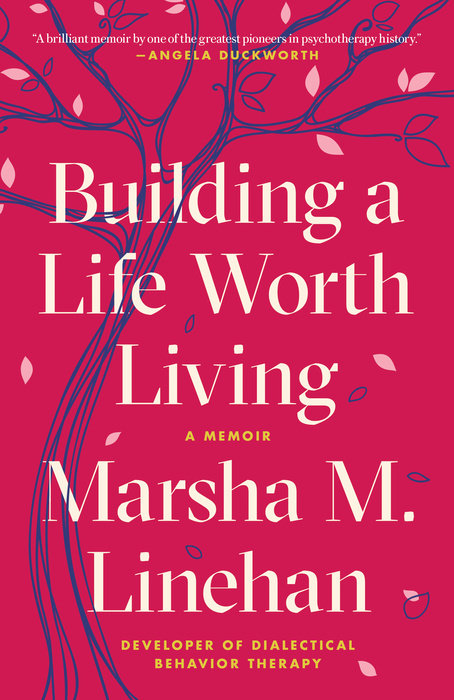<b>Marsha Linehan tells the story of her journey from suicidal teenager to world-renowned developer of the life-saving behavioral therapy DBT, using her own struggle to develop life skills for others.</b><br><br><b>“This book is a victory on both sides of the page.”—Gloria Steinem</b><br><br>“Are you one of us?” a patient once asked Marsha Linehan, the world-renowned psychologist who developed dialectical behavior therapy. “Because if you were, it would give all of us so much hope.” <br><br> Over the years, DBT had saved the lives of countless people fighting depression and suicidal thoughts, but Linehan had never revealed that her pioneering work was inspired by her own desperate struggles as a young woman. Only when she received this question did she finally decide to tell her story.<br><br>In this remarkable and inspiring memoir, Linehan describes how, when she was eighteen years old, she began an abrupt downward spiral from popular teenager to suicidal young woman. After several miserable years in a psychiatric institute, Linehan made a vow that if she could get out of emotional hell, she would try to find a way to help others get out of hell too, and to build a life worth living.  She went on to put herself through night school and college, living at the YWCA and often scraping together spare change to buy food. She went on to get her PhD in psychology, specializing in behavior therapy. In the 1980s, she achieved a breakthrough when she developed Dialectical Behavioral Therapy, a therapeutic approach that combines acceptance of the self and ways to change. Linehan included mindfulness as a key component in therapy treatment, along with original and specific life-skill techniques. She says, 'You can't think yourself into new ways of acting; you can only act yourself into new ways of thinking.'<br><br>Throughout her extraordinary scientific career, Marsha Linehan remained a woman of deep spirituality. Her powerful and moving story is one of faith and perseverance. Linehan shows, in <i>Building a Life Worth Living</i>, how the principles of DBT really work—and how, using her life skills and techniques, people can build lives worth living.
This webpage is for visitors who need to find essential information on Dr. Linehan’s work, including her most recent book “Building a Life Worth Living.”
'In Building a Life Worth Living, Marsha Linehan shares her experience of suicidal depression to help others who may be experiencing this themselves or someone they love. Since using what happens to us to help others is the final stage of healing, this book is a victory on both sides of the page.' -Gloria Steinem, New York Times bestselling.

About Dr. Linehan:
- Building a Life Worth Living: A Memoir. Marsha Linehan tells the story of her journey from suicidal teenager to world-renowned developer of the life-saving behavioral therapy DBT, using her own struggle to develop life skills for others.
- This webpage is for visitors who need to find essential information on Dr. Linehan’s work, including her most recent book “Building a Life Worth Living.” About Dr. Linehan: Marsha Linehan is Professor Emeritus of Psychology in the Department of Psychology at the University of Washington.
Marsha Linehan is Professor Emeritus of Psychology in the Department of Psychology at the University of Washington. She is the developer of Dialectical Behavior Therapy (DBT), a treatment originally developed for the treatment of suicidal behaviors and since expanded to treatment of Borderline Personality Disorder (BPD) and other severe and complex mental disorders, particularly those that involve serious emotion dysregulation. In comparison to all other clinical interventions for suicidal behaviors, DBT is the only treatment that has been shown effective in multiple trials across several independent research sites. It has been shown both effective in reducing suicidal behavior and cost-effective in comparison to both standard treatment and community treatments delivered by expert therapists. It is currently the gold-standard treatment for Borderline Personality Disorder, a condition characterized by pervasive and difficult-to-manage emotion dysregulation.
Dr. Linehan retired from the university in 2019 and is not available for interviews.


Quotes from Dr. Linehan’s Memoir:
“My life is something of a mystery because, to this day, Ihave no idea how I descended into hell so swiftly and completely, at the age ofeighteen. I hope that my success ingetting out of hell and staying out will bring hope to those who are still inhell. My basic belief is that if I can do it, others can do it, too.” (page 11)
“I know what hell feelslike, but even now I can’t find words to describe it. Every word that comes tomind is so utterly inadequate to describe how terrible hell is. Even saying it is terrible communicatesnothing about the experience. When I reflect on my life, I often realize thatthere is no amount of happiness in the universe that could ever balance thesearing, excruciating emotional pain I experienced those many years ago.” (page23)
“The day when I was sitting in the piano room by myself, alonely soul in the midst of other lonely souls in the unit, I am not sure whatmade me do what I did next. Whatever itwas, there and then I made a vow to God that I would get myself out of hell andthat, once I did, I would go back into hell and get others out. That vow hasguided and controlled most of my life since then.” (page 29)
“DBT skills fall into four categories [mindfulness, distresstolerance, emotion regulation, and interpersonal effectiveness], each of whichis designed to solve different set of problems. The first two offer the path to acceptanceof reality as it is, while the last two, taken together, are change skills that help clients embracethe changes they need to make in their lives.” (page 169)
The development of DBT “…involved much trial and error, false starts, unexpected insights, and lucky breaks as the many different components of the treatment steadily coalesced into a coherent therapy. Ultimately, I was able to conduct a strictly controlled clinical trial that demonstrated that DBT is effective in helping highly suicidal people live lives experienced as worth living, the results of which I published in 1991. Until this point there had been no effective therapy for this population; now there was.” (page 173)
Building A Life Worth Living Marsha Linehan Recipes
Helpful Resources:
- In this Q&A with Ursula Whiteside, Dr.Linehan talks about her memoir, spirituality, and having a sense of purpose inlife.
https://depts.washington.edu/uwbrtc/resources/qa-with-marsha-linehan/
- Lectures honoring Dr. Linehan at her retirementcelebration in May 2019
https://depts.washington.edu/uwbrtc/news-events/presentations-events/
A Life Worth Living Pdf
- For info about the effectiveness of DBT and its adaptions to specific populations, please see this summary: https://behavioraltech.org/research/
- In 2011, the New York Times published an articleabout Dr. Linehan in which she revealed the psychological struggles she hadexperienced as a young woman.
https://www.nytimes.com/2011/06/23/health/23lives.html
- In 2016, Dr. Linehan gave a public lecture onDBT titled “Dialectical Behavior Therapy (DBT): Where We Were, Where We Are andWhere Are We Going”
https://vimeo.com/325097903
- In 2007, Dr. Linehan gave a public lecture on suicidetitled “Suicidal Individuals: Evaluation, Therapies, and Ethics”
https://vimeo.com/325098873

- To find certified DBT clinicians or programs,please go to the DBT-Linehan Board of Certification:
https://dbt-lbc.org/index.php?page=101163
- To find resources for friends and family membersof BPD individuals, please visit the National Education Alliance for BorderlinePersonality Disorder site:
https://www.borderlinepersonalitydisorder.org/about-nea-bpd/
If you cannot find the info you need on this page, please contact brtc@uw.edu

